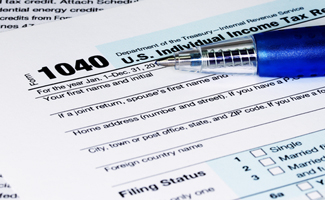DC Circuit rules against Trump on tax returns, says subjecting ex-president to laws is not 'bug' in system

Image from Shutterstock.
A federal appeals court has ruled that a congressional committee can obtain tax returns for former President Donald Trump as part of its investigation into presidential audits.
The U.S. Court of Appeals for the District of Columbia Circuit ruled that there was no impediment under the U.S. Constitution to the quest to obtain the returns by the House of Representatives’ Ways and Means Committee, report Law.com, the New York Times, Law360 and Reuters. How Appealing links to the Aug. 9 opinion and additional coverage.
The D.C. Circuit said the committee request was a constitutional exercise of its investigative powers because it identified a legitimate legislative purpose. The request did not violate separation of powers because it did not impose an excessive burden, the appeals court said. And the law giving the committee broad authority to request tax returns was not unconstitutional on its face because there are many circumstances in which it can be validly applied, including in the instant case, according to the appeals court.
The D.C. Circuit also rejected an argument by Trump that the U.S. Department of the Treasury’s decision to give the returns to the committee violated his First Amendment rights because it was retaliatory.
The chairman of the House Ways and Means Committee, Democratic U.S. Rep. Richard E. Neal of Massachusetts, had said lawmakers needed Trump’s tax returns to gather information on the presidential tax audit program and the need for legislation that would protect IRS employees doing the work.
“The chairman has identified a legitimate legislative purpose that it requires information to accomplish,” the appeals court said. “At this stage, it is not our place to delve deeper than this. The mere fact that individual members of Congress may have political motivations as well as legislative ones is of no moment. Indeed, it is likely rare that an individual member of Congress would work for a legislative purpose without considering the political implications.”
Lawyers for Trump had said the request by the congressional committee would empower a future Congress to threaten a sitting president with invasive requests after leaving office. The appeals court also rejected that argument.
“While it is possible that Congress may attempt to threaten the sitting president with an invasive request after leaving office, every president takes office knowing that he will be subject to the same laws as all other citizens upon leaving office,” the D.C. Circuit said. “This is a feature of our democratic republic, not a bug.”
The appeals court decision affirmed a December 2021 ruling by U.S. District Judge Trevor McFadden of the District of Columbia.
Senior Judge David Sentelle wrote the opinion for the D.C. Circuit panel, while Judge Karen LeCraft Henderson wrote a partial concurrence. According to Law.com, the panel “was unanimous on most of the central issues of the case.”
Henderson said the committee request may not be so broad as to violate separation of powers in this case. But “a more searching inquiry into the burdens imposed by the committee’s request is warranted given the core constitutional principle at issue,” she wrote.
Trump is likely to ask the U.S. Supreme Court to hear the case, according to the news coverage. That delay could push back resolution of the case until after the November elections. If Republicans take control of the House, the committee majority would likely drop the request for the tax returns.
The Treasury Department said it would comply with the tax return request after the Department of Justice’s Office of Legal Counsel reversed its position on the issue.
During the Trump administration, the DOJ’s Office of Legal Counsel said the returns should not be disclosed. The Office of Legal Counsel reversed itself during the Biden administration in a July 2021 opinion.
That opinion cited the Internal Revenue Code, which says the Treasury secretary “shall” provide tax return information to any of three congressional committees upon written request.
See also:
ABAJournal.com: “Trump sues niece for disclosing his tax records and the New York Times for encouraging it”
ABAJournal.com: “Trump’s bid to block tax records subpoena based on ‘implausible speculation,’ 2nd Circuit says”



